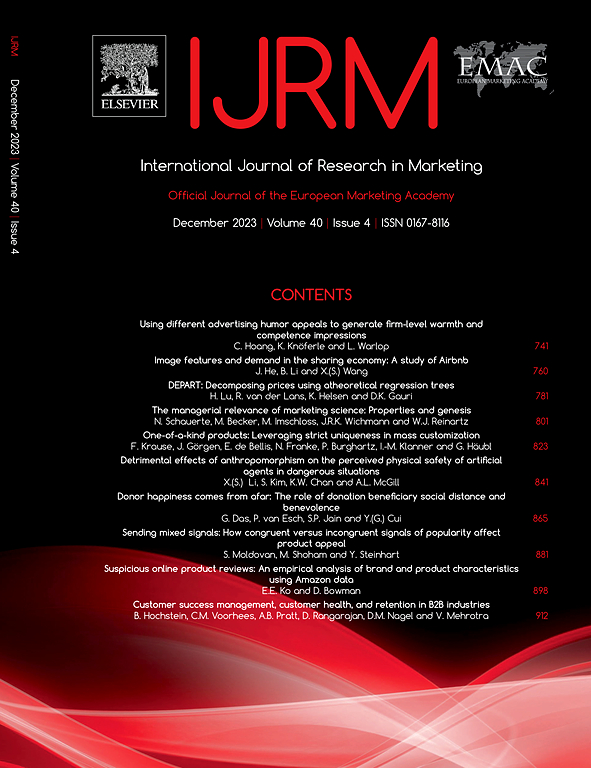Loss framing increases entity theorists’ vaccine uptake
IF 7.5
2区 管理学
Q1 BUSINESS
International Journal of Research in Marketing
Pub Date : 2024-12-01
DOI:10.1016/j.ijresmar.2024.04.002
引用次数: 0
Abstract
Although vaccination is an effective way to protect individuals against contagious diseases (e.g., COVID-19 and influenza), vaccine hesitancy remains widespread. This research seeks to understand why some individuals are hesitant to be vaccinated and proposes communication strategies to increase their vaccine uptake. Specifically, we examine how individuals’ implicit theory orientation (entity vs. incremental) drives their vaccine hesitancy and how different message framing techniques (gain vs. loss) can mitigate this tendency and increase vaccine uptake. Across six studies (N = 2,773, among which three studies were pre-registered), we demonstrate that entity (vs. incremental) theorists exhibit lower intentions for vaccination against various contagious diseases. Moreover, entity theorists’ vaccination intentions were higher when framing the consequences of not getting vaccinated as a loss than framing the benefits of getting vaccinated as a gain. In contrast, message framing does not affect incremental theorists’ intentions for vaccination. In conclusion, this research enhances our understanding of factors influencing vaccine uptake, sheds light on the interaction between implicit theory orientation and message framing in the context of infectious diseases and offers practical communication strategies for health officials and policymakers to address vaccine hesitancy.
损失框架增加了实体理论家的疫苗接种率
虽然接种疫苗是保护个人免受传染性疾病(如 COVID-19 和流感)侵害的有效方法,但疫苗接种犹豫不决的现象仍然普遍存在。本研究试图了解一些人对接种疫苗犹豫不决的原因,并提出提高疫苗接种率的沟通策略。具体来说,我们研究了个人的内隐理论取向(实体与渐进)如何导致他们对疫苗犹豫不决,以及不同的信息框架技术(收益与损失)如何减轻这种倾向并提高疫苗接种率。通过六项研究(N = 2,773,其中三项研究为预先注册),我们证明了实体(与增量)理论者对各种传染病的疫苗接种意愿较低。此外,当把不接种疫苗的后果设定为损失时,实体论者的接种意愿要高于把接种疫苗的益处设定为收益时的接种意愿。相比之下,信息框架并不影响增量理论者的疫苗接种意愿。总之,这项研究加深了我们对疫苗接种影响因素的理解,揭示了传染病背景下内隐理论取向与信息框架之间的相互作用,并为卫生官员和政策制定者提供了实用的沟通策略,以解决疫苗接种犹豫不决的问题。
本文章由计算机程序翻译,如有差异,请以英文原文为准。
求助全文
约1分钟内获得全文
求助全文
来源期刊
CiteScore
11.80
自引率
4.30%
发文量
77
审稿时长
66 days
期刊介绍:
The International Journal of Research in Marketing is an international, double-blind peer-reviewed journal for marketing academics and practitioners. Building on a great tradition of global marketing scholarship, IJRM aims to contribute substantially to the field of marketing research by providing a high-quality medium for the dissemination of new marketing knowledge and methods. Among IJRM targeted audience are marketing scholars, practitioners (e.g., marketing research and consulting professionals) and other interested groups and individuals.

 求助内容:
求助内容: 应助结果提醒方式:
应助结果提醒方式:


